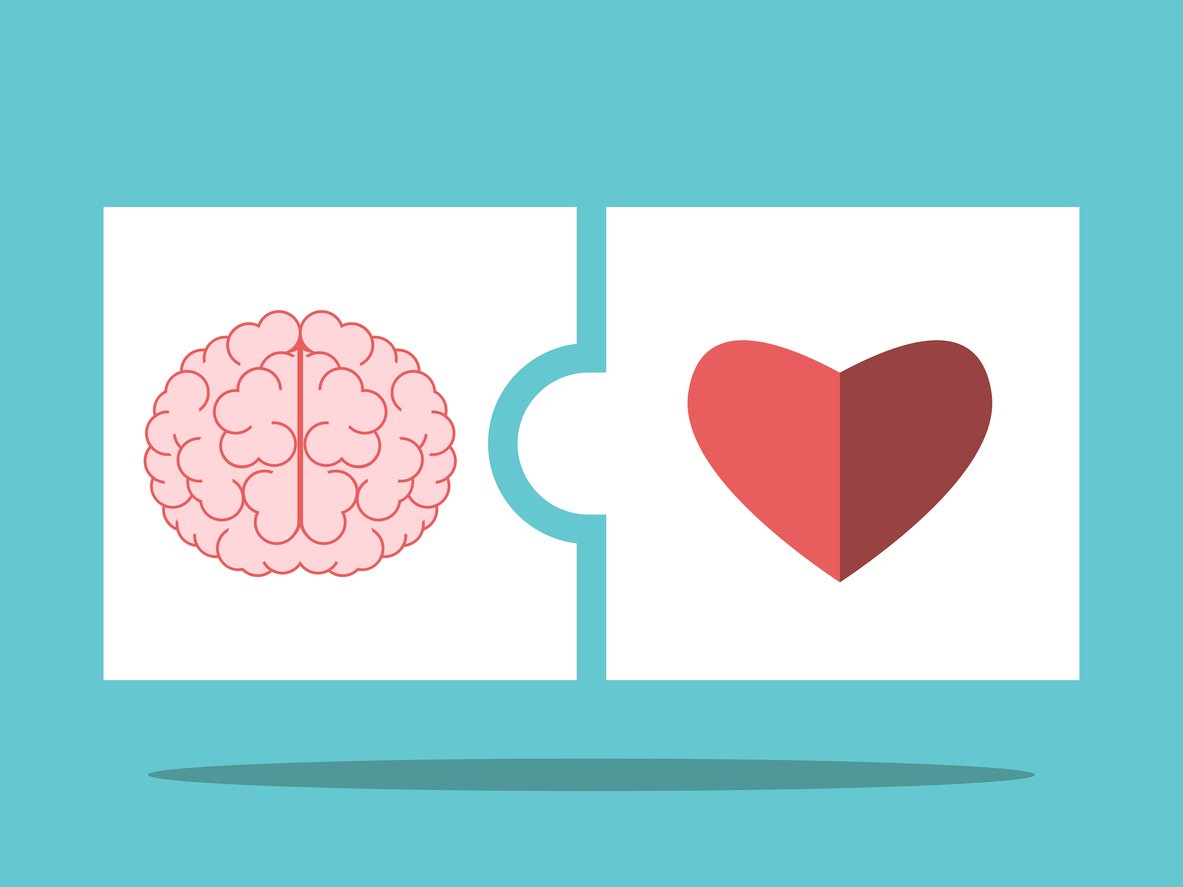An exhaustive Google search confirmed what I had long suspected: There are no popular songs about livers or kidneys. Celine Dion never penned the immortal lyric, “My gallbladder will go on.” The Bee Gees and Al Green chose not to wonder, “How can you mend a broken appendix?” And Neil Young didn’t lament about his search for a spleen of gold.
When it comes to love songs, it’s the heart, the whole heart, and nothing but the heart. (I said love, not lust.)
So why is that? What’s the link between the bright red emoji and the complicated four-chambered organ in the middle of your chest? Why have millennia of poets and musicians from around the globe associated that little blood pump with intense feelings of connection and desire?
Could there be actual scientific truth, and cardiovascular significance, to the metaphors?
From Physical to Emotional Hearts
This viewpoint of the heart as a purely physical organ has determined the shape of modern cardiology. Medical professionals measure heart health via blood pressure, cholesterol and triglycerides, and heart rhythm via EKGs. And when there are problems, they’re described and treated in material terms via medications and physical interventions like surgeries.
I’m not saying there’s no merit to this approach. On the contrary, modern cardiac medicine saves lives on a daily basis. Improvements in cardiac care, including new drugs and innovations in heart implant technology, have lowered the mortality rate from heart disease in the industrialized world — saving millions of lives.
At the same time, modern science is rediscovering what many traditional cultures have known since time immemorial: that the heart is much more than a physical pump. While we know that lifestyle, especially diet, has a major impact on the physical aspects of heart health, there’s another factor related to heart health that’s not talked about as often as it deserves to be: your emotions.
However, in 2004, researchers conducted the first large-scale trial looking at emotions and the heart. The INTERHEART study enrolled over 25,000 participants in 52 countries and clearly identified several emotional stressors as key risk factors for heart disease. And continuing research is filling in the picture, as well as creating protocols for healing “broken hearts” on both the emotional and physical levels.
In this article, we’re going to look at the emotional side of the heart, how your feelings (both pleasant and unpleasant) can impact your heart, and how to take care of your emotional heart.
Can Your Heart Think or Feel?
For a long time, Western science assumed that the brain was the only part of the body that “thinks.” All the other organs and systems were, in this view, mindless automata just carrying out instructions from the brain. This theory was turned on its head by the discovery that the gut also has something of a “brain,” in the form of what’s known as the enteric nervous system.
And more recently, researchers are coming to recognize another kind of “brain” within the heart as well — a discovery that helped spawn the field of neurocardiology.
Wait a second, though. What does it mean to say there’s a “brain” in the gut or the heart? Are we literally talking about a cauliflower-shaped lump of gray squishy stuff in there?
No, “brain” here is a metaphor, referring to particular functions: the ability to sense the environment, make decisions based on that information, and communicate those decisions throughout the body. And by those criteria, the heart does indeed have a brain, which trades information back and forth with the head brain.
The Heart’s “Little Brain”
Renowned cardiologist and FRN’s Healthy Heart Course partner, Dr. Mimi Guarneri, calls it the body’s “little brain,” since it has, in her words, “its own intelligence, emotions, nervous system, and decision-making power.”
We now know that the heart includes the hardware to run all this brain-like software. In fact, the heart has its own nervous system, called the intrinsic cardiac nervous system (ICNS). The ICNS can manufacture and secrete hormones and operates similarly to the brain’s nervous system via an intricate network of nerve clusters, neurotransmitters, proteins, and other cells.
All this circuitry enables the heart to act independently of the brain. The heart can feel and sense your internal world (and aspects of the external world) directly and can learn, store memories, and make decisions. And what the heart feels turns out to have a direct impact on how well it functions and how long it lasts.
In short, as Dr. Guarneri puts it, your heart is a “mental, emotional, and spiritual organ with many complex connections that go well beyond pumping blood.”
How Pleasant Feelings Impact the Heart
In healing traditions throughout the world, the heart is seen as the emotional center of the body. In Indian Ayurvedic texts as well as Greek and Roman literature, the emotion most closely associated with the heart is love. In Traditional Chinese Medicine, it’s joy.
Many people report feeling the sensations of love, caring, and joy emanating from the heart or chest area. And it’s not just cultural mythology; the heart actually is a sensory organ, capable of feelings. In fact, one of the hormones that the heart manufactures is oxytocin, the so-called “cuddle” or “love” hormone that activates when we feel close to another person, a companion animal, or something greater than ourselves.
Pleasant emotions make you feel good, which is reason enough to want to feel them on a regular basis. But here’s another reason: they also provide protection for your heart.
Loving Touch
Love is a potent cardioprotective emotion. Hugging and other forms of loving touch can lower blood pressure and heart rate. Oxytocin triggers vasodilation or the widening of the arteries. When that happens, more blood can flow through the arteries, lowering blood pressure and reducing the risk of heart attacks and strokes.
Laughter and Heart Health
Laughter also puts a smile on your heart as well as your face. The act of laughing releases chemicals called beta-endorphins, part of that feel-good family of endorphins. These beta-endorphins coax receptors on the vascular endothelium to release nitric oxide, a molecule that protects the cardiovascular system in many ways. When you laugh on a regular basis, you’re at lower risk of heart attack and stroke than your more dour counterparts. And laughter reduces stiffness and damage to blood vessels as you age.
Gratitude and Heart Health
Gratitude also helps your heart function at its healthiest. In Dr. Guarneri’s words:
“An attitude of gratitude is not just a mental tool, it can also be good for your physical health — especially your heart… Research has shown that individuals who practice gratitude are healthier, exercise more, have fewer physical ailments, and feel better overall. Clinical trials have proven that ritual gratitude can even lower your blood pressure and increase your immune function — having dramatic, and lasting effects on your health.”
Gratitude can begin to heal your heart even after significant damage. A 2016 study looked at the benefits of keeping a gratitude journal for older patients (average age was mid-60s) with Stage B heart failure. The participants who journaled regularly for eight weeks saw their inflammatory biomarkers go down significantly compared to non-journaling controls. While journaling, their heart rate variability (HRV) improved as well.
And in other studies, regular expressions of gratitude and optimism have been correlated with both lower heart rate and blood pressure.
| An Aside on Heart Rate Variability |
|---|
| Neurocardiac researchers are extremely interested in HRV, as it appears to be an extremely important biomarker for overall health and cardiovascular health, in particular. Physicians used to believe that a normal heart rhythm was a steady, even beat, like a metronome. But we now know that there’s a difference in interval length between beats depending on whether the person is inhaling or exhaling. And the bigger the difference (and the smoother the “sine wave” of the variance), the healthier the individual and the more resilient to stressors. Since the opposing branches of the autonomic nervous system, the excitatory sympathetic and the calming parasympathetic, work in tandem to create the heart rate variations between beats, a smooth and large HRV is believed to represent a healthy dynamic balance between the two. |
How Unpleasant Feelings Impact the Heart
While agreeable emotions like love, gratitude, and hopefulness can protect the heart, unpleasant emotions can have the opposite effect. Four well-studied (and for most of us, very familiar) “negative” emotions include depression, grief, stress, and anger. Let’s take a look at each of these now — and then we’ll look at what can help you (and your heart) feel better.
Depression and Heart Disease
Someone with depression now is at increased risk of heart disease in the future. (And the relationship goes in both directions, as many cardiac patients develop depression in response to their diagnosis.)
In Dr. Guarneri’s words:
“While about one in twenty American adults experience major depression in a given year, that number jumps to about one in three for people who have survived a heart attack. And, the risk of having a heart attack is four times greater in people with heart disease who also suffer from depression when compared to those who are not depressed.”
The American Heart Association reported in a 2015 scientific statement that even teens with depressive disorder were at greater subsequent risk for heart disease. While the exact mechanisms aren’t yet known, one promising theory links depression to heart disease via lower HRV. That’s because, the theory goes, depression disturbs the balance between the sympathetic and parasympathetic nervous systems.
That could explain why coexisting anxiety can also increase cardiac risk; anxiety represents a constant drain on the autonomic nervous system, which can further depress HRV.
Grief’s Impact on the Heart
When people say they have a “broken heart,” they aren’t just speaking in metaphor. It turns out the phrase has a sound physiological basis. Grief — an intense emotional response to loss — can damage the heart and leave it vulnerable to acute and chronic injury.
Takotsubo cardiomyopathy, also called broken heart syndrome, can cause heart attacks without the presence of an arterial blockage. The disease gets its name from the shape the affected heart takes, which resembles Japanese ceramic vases used as pots to catch octopi (“tako tsubo”).
A person who has recently lost a spouse is at a significantly elevated risk of developing and dying from heart disease. While part of this may be due to changes in lifestyle (eating poorly or not getting out as much, for example), there are also direct biochemical pathways.
Bereavement can lead to elevated catecholamines, which are stress hormones, and higher blood pressure. Both of these are effects of great sympathetic nervous system activity.
But it’s not just the loss of a spouse that can trigger such heartrending grief. Those who lose a parent or a child also face an increased risk of a cardiac event.
Stress and the Heart
Psychosocial stress (a fancy way of saying that there’s a gap between the demands of your life and your capacity to meet those demands) may be as bad for your heart as an unhealthy diet or even smoking, according to recent research.
And while eating poorly or smoking may be within an individual’s control, the “social” in psychosocial indicates that external stressors may be difficult or impossible to avoid or mitigate. Things like job stress, racism, poverty, and chronic stress conditions like PTSD are all associated with a higher risk of hypertension.
While stress can damage the cardiovascular system at any age, it’s most strongly associated with early onset (prior to age 50) cardiovascular disease (CVD). Think of an engine that’s constantly revving too fast and too hot. The sustained sympathetic nervous system activity characterized by chronic stress has been shown to do a number on the cardiovascular system. Mechanisms of damage include arrhythmias, platelet aggregation, acute coronary syndromes, and heart failure.
Anger and Heart Health
If depression is about shutting down, then anger is about lashing out. Those prone to angry outbursts have been found to be at greater risk of CVD, stroke, and heart failure.
In Dr. Guarneri’s words:
“Emerging research on how anger can affect your body is quite disturbing: being angry can increase your risk of a heart attack by as much as 230%! Stress and anger can trigger more than 1,400 chemical reactions in your body. These oftentimes lead to measurable physical changes in your cardiovascular system.”
Anger doesn’t occur in a vacuum but rather in an existing environment, and it may be the case that the more stressful that environment, the more corrosive the effects of an individual’s anger on their heart health. One study found a positive association between anger expression and the risk of CVD among urban residents but not rural residents. Researchers hypothesized that the more stressful city atmosphere enhanced the association between anger and CVD.
Another study found anger may contribute to the development of specific cardiovascular diseases and CVD mortality, especially heart failure in men and in those with diabetes.
How to Take Care of Your Emotional Heart
Just as depression, grief, stress, and anger can have a negative impact on your heart health, it turns out that cultivating positive and pleasant emotions can protect and even heal your heart.
Experience Love
Social connection and love are powerful antidotes to loneliness, which, as we’ve seen, can lead to the development of CVD. Spending time with loved ones, even over the phone or via video call, can stimulate the production of oxytocin and other pro-social and heart-friendly neurotransmitters.
Socializing at any age provides long-term health benefits to your heart. A fascinating 2018 study found that teen boys whose parents reported them spending more time with friends grew — 20 years later! — into men with lower blood pressure and healthier body mass index — both of which are predictors of heart health.
An action step here is to work on increasing the expression and experience of love in your life. The more quality time you spend with friends and loved ones, the greater your production of oxytocin.
Cultivate Inner Peace
Inner peace is an antidote to rampant and overwhelming stress, and can also moderate your angry responses. Activities like yoga, prayer, meditation, and other spiritual or contemplative practices have all been shown to improve biomarkers of cardiovascular risk.
Mindfulness helps you practice nonjudgmental awareness of your feelings and surroundings, which gives you the space to choose your response rather than just reacting with emotions and expressions that can compound your stress.
And tai chi, a gentle martial art based on principles of Traditional Chinese Medicine, has been shown to help suppress inflammation and lift depression.
Relaxing lifestyle activities can all improve your parasympathetic tone, strengthening your ability to maintain a healthy blood pressure and heart rate in the face of life’s inevitable stressors.
Cultivate Positivity
When it comes to heart health, thinking positively can become a self-fulfilling prophecy. A 2019 meta-analysis of studies of almost 230,000 people found that those who were more optimistic had a lower risk of CVD.
Positive well-being, which refers to having positive feelings and a sense of optimism, is also associated with less mental stress and more resilience. Making an effort to experience positive emotions daily can counteract the influence of negative emotions on systolic blood pressure.
I’m not suggesting that you try to banish all unpleasant emotions or aggressively recite positive affirmations every time you feel sad or angry or afraid. These so-called “negative” emotions can serve a valuable purpose. Grief when confronted with loss is totally natural, and not something that I’d recommend you try to bypass or “get over” just to lower your blood pressure.
Instead, I’m talking about seeking balance. The world that most of us live in doesn’t actively afford us multiple daily opportunities to relax, slow down enough to appreciate our lives, or connect with friends, neighbors, and loved ones. That means we need to be deliberate and proactive about making sure we build these heart-healthy — and life-affirming — practices into our days.
Curious about gratitude? Discover the neuroscience of gratitude, and specific practices that have been proven to improve health as well as happiness.
What You Feel Impacts Your Heart
The heart is not just a physical organ. It’s also an emotional one with its own nervous system. What you feel can have a direct impact on the health of your heart. When you cultivate more love, peace, and gratitude, things don’t just feel better. They also support your health, which makes them get better, too.
Tell us in the comments:
- Have you ever experienced the effects of emotions — pleasant or unpleasant — on your health?
- What are your favorite strategies and practices for cultivating positive emotions?
- What’s one thing you could build into your day that would afford you greater joy and resilience?
Featured image: iStock.com/fizkes










